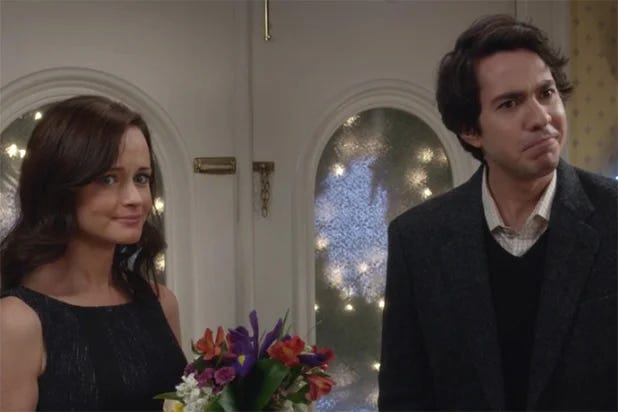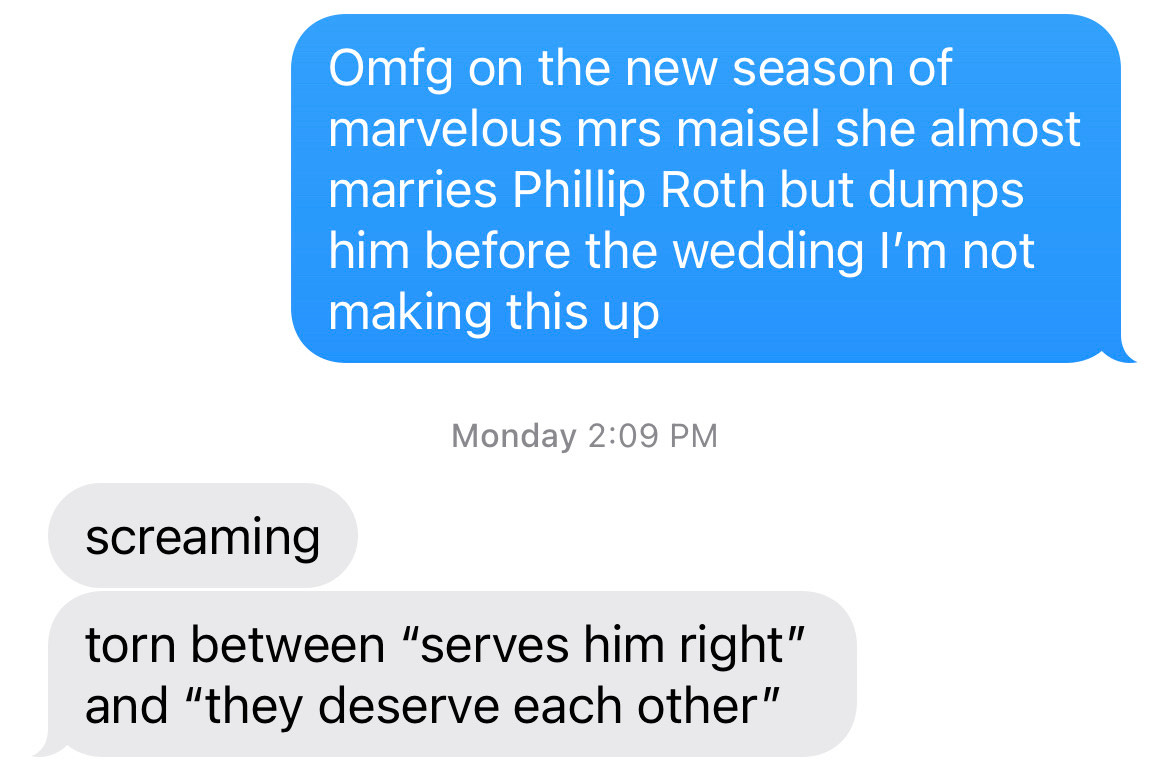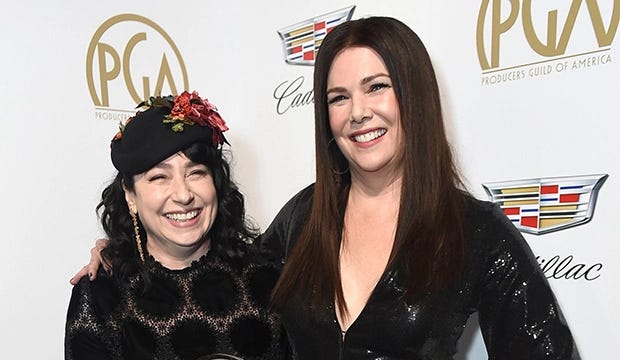*This newsletter contains light spoilers for The Marvelous Mrs. Maisel finale. Yes, we probably needed this disclaimer in previous newsletters…. oh well.
The Marvelous Mrs. Maisel ended as many suspected it would, with housewife-turned-comedian Midge Maisel finally getting her big break on a fictionalized version of The Johnny Carson Show. She’s not supposed to give the standup set — late night host Gordon Ford took the opportunity away at the last minute. But she steals the mic anyway, breaking the rules as she’s done throughout the entirety of the series. By the end, everyone in the audience is on their feet clapping and Ford himself is humbled by her greatness. He says when she finishes, “Ladies and gentlemen, the magnificent, the magical, the marvelous Mrs. Maisel.”

It mirrors the pilot, when Maisel steals a different microphone in a lower Manhattan comedy club and delivers an accidental, but barn burner of a stand up set. This is, in all respects, exactly how the show should have ended: coming full circle but with a distance that feels earned — after all, we’ve watched her work up to this moment for five seasons.
My issue though, is that despite the name of the show, Ford’s superlatives don’t ring entirely true.
The set is, like most of Midge’s standup, underwhelming. There are some decent jokes thrown in there, but she ventures out of comedy all together and into proselytizing about the trials of being a woman trying to have it all. If you’ve been to a comedy show, you know how uncomfortable it is when the comic journeys into speech territory, attempting to convey a message you’re not sure whether to laugh at or be moved to tears by so you sit awkwardly in the inbetween. The idea that a crowd full of people are hanging onto every word is a stretch of the imagination at best. You see this happen many times throughout the series, where sets that would have flopped in the real world are met with roaring laughter and applause.
This isn’t surprising coming from showrunner Amy Sherman-Palladino, who tends to write female protagonists we’re meant to view as all but perfect.
Midge isn’t too far off from another one of Sherman-Palladino’s tall, beautiful, impossibly proportional brunettes: Gilmore Girls’ Lorelai Gilmore. They both talk too fast and crack jokes at inappropriate times, but this just makes them even more aspirational. They’re real women without actually being real. Like if you put Barbies in a Barbra Stanwyck film1.
But when a show hinges on a character who is, for lack of a better word, marvelous — beloved by all, the most beautiful one in the room, but also the loudest and the funniest and the most intellectual without being snobby and also good at anything they try — you can really only go down from there.
This is a perfectly fine set up for a story about a fall from grace, a Nietzchien god’s slow descent into insignificance. And ultimately, that’s often the story Sherman-Palladino ends up telling, but I don’t think it’s the story she sets out to tell.
In Gilmore Girls, Lorelai has two jobs in which she excels: she’s the manager/eventually owner of an inn, and she’s a mom. We see the people in her life marvel at how superhuman she is to have gotten pregnant at 16, moved to a town where she knew no one, worked her way up the ladder from maid to small business owner and inexplicably purchased (BOUGHT!!) a house in Connecticut, all while being a present mother to her daughter Rory.
But Lorelai treats Rory less like a daughter and more like a best friend, and the show is at its best when it acknowledges the problems this dynamic creates.
We’re told that Rory, like her mom, is perfect. She is pretty and skinny even though they both eat copious amounts of food, and boys like her so much it’s actually a problem. She’s also genius-level smart according to her doting grandfather who once ostentatiously claimed that she could recite the periodic table at 4-years-old and discuss Schopenhauer at 10. But aside from watching her crack open some giant books, you don’t really witness Rory’s intellect. It's usually the opposite. You see her pitch boring story ideas to her newspaper editor or skip out on summer internships to go to Europe with her grandmother. I often wonder whether the audience is really supposed to believe Rory is a prodigy, or if the constant praise by the people around her has simply set her up for failure.
She herself is confronted with this question when high-powered newspaper owner Mitchum Huntzberger2 (if there is anything Sherman-Palladino is fantastic at it’s crafting rich-people names), tells Rory after a summer internship that she “just doesn’t have it.” This is perhaps the first real negative feedback she’s ever gotten in her life and it sends her into so deep a spiral she steals a yacht and drops out of Yale. But in the end, Huntzberger is framed as a villain who was wrong. It’s never really clear if we’re supposed to view Rory as a genius, or as mediocre at best.
Sherman-Palladino and her husband were booted off the show by the network in 2006 because they asked for more writers and a better parking spot (I’d yell at the CW, but there’s nothing left to yell at now.... The Palladinos really said, Karma is my boyfriend). But when they came back to write Gilmore Girls: A Year in the Life in 2016, they wrote Rory’s arc a little more clearly: Rory’s entitlement left her without a true work ethic. At 32, she was floundering and jobless and not particularly talented.

I still don’t believe Sherman-Palladino always intended it this way, but if we are going to believe that Rory has been a flailing idiot all along, we have another character to blame: Lorelai. When you raise a kid as your best friend and you tell her she is the brightest star in all the land, you’re probably going to end up with Year in the Life Rory Gilmore. The true fall from grace shouldn’t really have been Rory’s, it should have been Lorelai’s. The show doesn’t really connect these dots though. Thus the arc doesn’t feel purposeful, it feels like an accidental side effect of crafting a protagonist as perfect-on-paper as Lorelai Gilmore.
Then fast forward to Midge Maisel. This time, perfection is baked into the title.
In some ways, the show is set up like a fall from grace. Midge is introduced as the perfect housewife. She is literally perfectly symmetrical (she measures every night just to be sure), she makes an incredible brisket, her apartment on the Upper West Side is spotless. But she’s also funny and bubbly. If she was ever murdered, people would say “she lit up the room” and it would be true.
Her fall, really, has nothing to do with her own failings. It’s her husband Joel who can’t handle the fact that she’s good at everything and he’s good at nothing. He tells her he’s leaving her, and her perfect world falls apart.
But her world was perfect because she made it that way. We watch her deliver a drunken monologue on stage at the Gaslight and it’s clear she was never meant for marriage anyway, she was meant for stardom — a credit to Rachel Brosnahan’s delivery (Rickles, MAYBE).
As the show goes on, Midge’s arc ebbs and flows in a way that, like both Rory and Lorelai’s, feels purposeless. Sometimes she really wants to be a comic so bad, sometimes she doesn’t care enough to skip a summer vacation in the Catskills. While the show takes many opportunities to showcase the challenges a woman would face in comedy in the 50s and 60s, it’s also quick to show that Midge can charm her way into most anything. Nearly everyone she meets falls in love with her. And some of her observational comedy about the challenges of being a woman fall flat when considering how effortlessly much of womanhood seems for her.
Brosnahan is also famously not Jewish, even though Midge’s Jewish identity is crucial to the show and a reflection of its creator. I can’t help but think that there’s a twinge of self hatred, or wish fulfillment wrapped up in all of Sherman-Palladino’s beautiful, tall, goyish women. I don’t know. All I’ll say is at one point in the final episodes of Maisel, Midge essentially ditches Philip Roth at the altar... you can draw your own conclusions...
I might be projecting a little as someone who started watching Gilmore Girls at nine years old and wanted to grow up to be like Rory and Lorelai. I mean, Christ, I became a journalist. I drank so much coffee it stunted my growth (a cruel irony). I did not apply to Yale because I knew I wouldn’t get in, but I digress.
I see pieces of them in myself now, embedded in my psyche, and they’re not all flattering. There’s a certain sense of humor and charm I picked up from Lorelai that can come off as entitled, a sense of superiority towards other women that infected me at a young age, and above all, a nagging desire to be thin and beautiful. I thought I’d eventually grow up to find boys harboring secret crushes on me or negging me into dating them until I reluctantly gave in (FINE! You win, Milo Ventimiglia. I will go out with you).
Plenty of other movies and TV shows had this messaging, but looking back on the show now, I realize Gilmore Girls was the most potent because, putting aside the movie star bodies, I did see myself in those characters. In the end, they were just Amy. And from looking at her work, I think Amy Sherman-Palladino and I are a lot alike. If I was given unlimited Jeff Bezos money, I too would recreate beautiful 1960s kitchen sets and buy Barbra Streisand needle-drops. I would definitely love a husband willing to be my number two in the writer’s room (god bless Daniel Palladino, he truly is Joel Maisel) and we would never have kids but I’d write about bad mothers all the time. And as much as I criticize Sherman-Palladino’s lack of editing skills (tell me why there is a 10-minute-long musical about literal GARBAGE in the middle of the final season when we could have gotten more scenes with Midge and Lenny?), the truth is, I’d have the same struggles. Hell, this essay is already a thousand words too long and is making two points (maybe even three) instead of the correct number of one.
I see Sherman-Palladino peppering her shows with new and improved versions of herself, the woman she wishes she was, and I understand that too. Though I fear I inherited that kind of self degradation from watching Gilmore Girls.
Watching now, I no longer look at these gorgeous fast-talking girlinas and see something aspirational. More often than not, I see my own flaws pointed back at me. They’re women who are talented, but they also talk too big of a game. They make themselves into something magical, marvelous and magnificent and then they’re trapped on a pedestal they were maybe never meant to sit on.
But God, I can’t help but relate.3 Maybe the four of us can all have big lives together standing on a giant vintage-pink soapbox.
B Plot
Question: What’s the best media within media? (Obviously Rachel is not going to say Midge’s stand-up)
Mallika’s answer: I can already hear our millions of subscribers yelling at me for talking about One Tree Hill too much but the albums Kate Voegele put out as Mia Catalano on the show were absolute bops. I cannot tell you how many times I listened to “99 Times” and “Manhattan from the Sky” back in the day. After spending an exorbitant amount of time on Voegele’s Wikipedia page, I also found this 2019 collab with Tyler Hilton (also on One Tree Hill) which made me very nostalgic.
Rachel’s answer: Since the new season of Black Mirror just came out, I’ll go with Ashley O dropping the best Miley Cyrus pop song since Bangerz: “On a Roll”. There was a time when I listened to this song everyday. It’s even crazier knowing this is a re-worked pop version of Nine Inch Nails song “Head Like a Hole,” which Miley also sings at the end of the episode. The RANGE.
C Plot
Variety’s Actors on Actors keep coming out, which means we keep getting moments like Emily Blunt asking Brian Cox if he doesn’t watch Succession because he’s self-critical or because he’s bored to which he very quickly replies “bored.” He later says “it’s not easy to be an icon — and a cultural icon at that.” We’re literally always saying that!
Also, this one is for our Barry/Succession-heads (Baccession? Succbarry?), please enjoy baby Sarah Goldberg and Jeremy Strong acting on stage together. Can they both reenact this at the Emmy’s?
Page Six reported The Idol — the sleazefest created by Euphoria’s head Sam Levinson and The Weeknd — won’t get a second season, which would make sense because, as we’ve written about before, it’s getting absolutely eviscerated by critics. But HBO’s PR team (it seems… thanks to Elon it’s impossible to tell who’s actually who on Twitter anymore), pushed back with a tweet saying there hasn’t actually been a decision on a second season. Rachel is famously refusing to watch The Idol (and encourages readers to instead watch the infinitely better HBO show about fame, The Other Two) but Mallika’s FOMO is too strong so she watched the first episode and her decision is season two or no season two, she’d be better off watching literally anything else.
John Hamm recently came out as a “Bravoholic” in an interview with his Mad Men co-star John Slattery, and more specifically a “Vanderpumper” although his favorite Real Housewives franchise is New Jersey. Don’t worry, he likes New York too, but is skeptical about the reboot. How do we think Betty Draper would do on Andy Cohen’s couch? Sound off in the comments! !!!!
Though I guess this just describes Barbra Stanwyck.
I can’t believe I name dropped Mitchum Huntzberger in here and not even Lenny Bruce...
Read: Kendall Roy’s '“God, I hope it’s in me”







